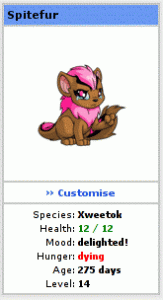Neopets is a website that was launched by Adam Powell and Donna Williams in late 1999 and in June 2005, purchased by Viacom for $160 million. Gameplay allows users to create and care for ‘Neopets’ and explore the online world of Neopia. The game does not have any requirements and is set up with an open world style, but users are expected to feed and care for their Neopets when they grow hungry or ill. Neopets will not die if neglected, but their health can limit their gameplay. From the Neopets FAQ:
“Can Neopets die?
No, Neopets do not die. If you do not look after your Neopet and don’t feed it, it will get very hungry and be dying. It won’t actually die though and you can nurse it back to full health with enough attention.”
Neopets is still up and running today with an estimated 92 millions accounts. The website allows its users to raise one of the few pets that will never die (similarly, “Nintendogs” does this, but “tamagotchi” has no qualms killing your pet), with the promise that however starved and neglected they become they will continue to live forever.
Do Neopets actually want this enforced immortality? This was enacted as an attempt to prevent kids from experiencing heartbreak when they logged in after a month of forgetting to feed their neopet and coming to find their pet dead and abandoned. This, originally an inventive and sweet gesture, has imposed a cruel life onto the Neopets of begging for death but never fully reaching it. Millions of Neopets currently wander around Neopia decrepit, starved, and wondering why the sweet embrace of death will never reach them. This gives us the insight of what Stephen Cave calls the “Tithonus Problem”
“Tithonus was a youth so handsome that he was kidnapped by Eos, goddess of the dawn, to be her lover. Terrified at the prospect of his one day dying, Eos begged Zeus to make Tithonus immortal like her. The the god did; but Eos had forgotten to ask that her lover also be granted eternal youth. As he aged, Tithonus lost all of this strength, becoming weak and demented. When all he could do was babble, Eos in desperation turned him into a cicada, forever alive but calling for death.”
Tithonus, like Neopets, has been granted immortality but suffers the problem of lacking good health or youthfulness. Immortality then becomes a hindrance to the enjoyment of life and the perpetuation of this style of life becomes unjust and torturous. By bringing Neopets into life, users have also granted them an awful version of immortality where their health stats will stay “dying” indefinitely. Unlike Tithonus, Neopets do not have an escape from the fragility of their own being, as they become engulfed in a longing for death with no possible escape other than the shutdown of the website, which has yet to happen. Depending on the average user’s span for playing regularly, most Neopets will not even experience a year of healthy life before plummeting into the unforgiving arms of immortality. There is a small base of regular players that keep up with the neopets, but this cannot surpass the amount of neopets that beg for death as they enter their tenth year waiting for death.
Perhaps this can give insight into our own quest for the continuation of physical life. With a currently expanding life expectancy, we must consider what constitutes a ‘happy’ and healthy life for our species and think to the Nintendogs and Neopets that have been granted immortality but stripped of any happiness. The result of immortality is not always a ‘utopia’ of healthy humans (or Neopets) that have prolonged their lives, but perhaps instead the innumerable amount of diseased and dying flooding hospitals and care facilities.
Link to Gamplay
https://www.youtube.com/watch?v=DIaDGcBOCpY
sources:
http://www.neopets.com/help.phtml?folderID=2572 (Neopets FAQ)
Cave, Stephen. Immortality: The Quest to Live Forever and How It Drives Civilization. New York: Crown, 2012. Print.
Recent Comments